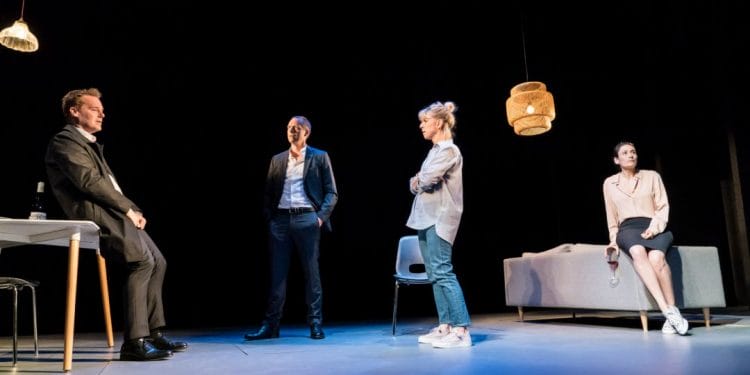 It’s been only thirteen short months since Nina Raine’s Consent had its premiere at The National Theatre, but in those months a series of seismic events have made the revival at The Harold Pinter Theatre even more important. Harvey Weinstein was the first in a line of celebrities who saw their destructive power crumble like a house of cards, while the Met Police were forced to apologise for not disclosing vital evidence that would have prevented a young man being taken to court accused of rape.
It’s been only thirteen short months since Nina Raine’s Consent had its premiere at The National Theatre, but in those months a series of seismic events have made the revival at The Harold Pinter Theatre even more important. Harvey Weinstein was the first in a line of celebrities who saw their destructive power crumble like a house of cards, while the Met Police were forced to apologise for not disclosing vital evidence that would have prevented a young man being taken to court accused of rape.
What we’ve learned in that time is that there are very complicated issues at play, how does the legal system ensure the guilty are punished, and the innocent truly vindicated? Nina Raine takes these complex issues as the basis for Consent; a group of friends battle their own relationship demons while handling rape cases in court. Only one of the friends is not a lawyer, but as an actress needs to brush up on her legalese for an audition, and ends up drawn in to the web of argument and debate.
Kitty (Claudie Blakely) and Ed (Stephen Campbell Moore), look like the perfect couple, until friends Jake (Adam James) and Rachel (Sian Clifford) start having marital difficulties, which exposes cracks in their own relationship. Tim (Lee Ingleby), just needs to find somebody, and along comes Zara (Clare Foster) to complete the trio of pairs, if only it were that simple! There’s a sixth character, wonderfully played by Heather Craney; a woman facing her rapist in court, and undergoing psychological torment as her whole life is dragged before a jury.
Among the five characters who make up the core group of friends, none of them are particularly endearing or likeable. They all appear to have cheated at some point or another, and they all demonstrate absolute selfishness. They talk about their cases as if they were products in a factory, processed one at a time in a round of glib comments. Yet, their story is compelling; the twists and turns mirroring a court room battle, as questions move to cross examination. The only judge and jury though, are the audience who are left to make up their own mind as to who is ‘right’ and who is ‘wrong’.
Director, Roger Michell controls the narrative in Consent tightly, with the scenes well blocked to provide clarity on the time and setting. The set from Hildegard Bechtler is stunningly modern and minimalist, giving the production a strong contemporary look, and Consent is indeed a contemporary play of striking urgency.
























